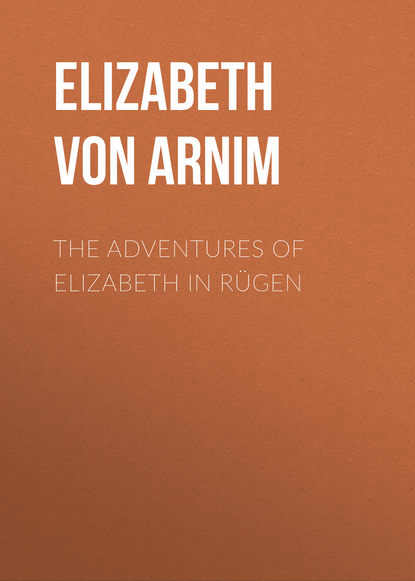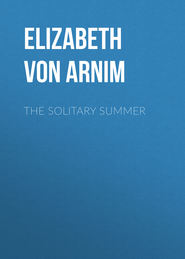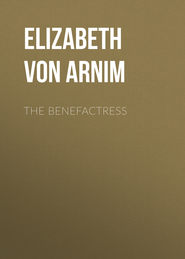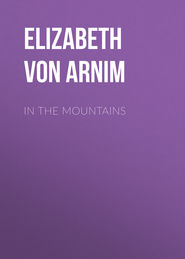По всем вопросам обращайтесь на: info@litportal.ru
(©) 2003-2024.
✖
The Adventures of Elizabeth in Rügen
Настройки чтения
Размер шрифта
Высота строк
Поля
The bishop's wife had not moved. She stood staring out to sea, and her stare grew ever stonier.
'I wish–' she began; but did not go on. Then, there being plainly no means of stopping Ambrose's cordiality, she wisely resolved to pass the time while we waited for him in exchanging luminous thoughts with me. And we did exchange them for some minutes, until my luminousness was clouded and put out by the following short conversation:—
'I must say I cannot see what there is about Germans that so fascinates Ambrose. Do you hear that empty laughter? "The loud laugh that betrays the empty mind"?'
'As Shakespeare says.'
'Dear Frau X., you are so beautifully read.'
'So nice of you.'
'I know you are a woman of a liberal mind, so you will not object to my saying that I am much disappointed in the Germans.'
'Not a bit.'
'Ambrose has always been so enthusiastic about them that I expected quite wonders. What do I find? I pass over in silence many things, including the ill-bred mirth—just listen to those people—but I cannot help lamenting their complete want of common sense.'
'Indeed?'
'How sensible English people are compared to them!'
'Do you think so?'
'Why, of course, in everything.'
'But are you not judging the whole nation by the few?'
'Oh, one can always tell. What could be more supremely senseless for instance'—and she waved a hand over the bay—'than calling the Baltic the Ostsee?'
'Well, but why shouldn't they if they want to?'
'But dear Frau X., it is so foolish. East sea? Of what is it the east? One is always the east of something, but one doesn't talk about it. The name has no meaning whatever. Now "Baltic" exactly describes it.'
THE SEVENTH DAY
FROM BINZ TO STUBBENKAMMER
We left Binz at ten o'clock the next morning for Sassnitz and Stubbenkammer. Sassnitz is the principal bathing-place on the island, and I had meant to stay there a night; but as neither of us liked the glare of chalk roads and white houses we went on that day to Stubbenkammer, where everything is in the shade.
Charlotte had not gone away as she said she would, and when I got back to our lodgings the evening before, penitent and apologetic after my wanderings in the forest, besides being rather frightened, for I was afraid I was going to be scolded and was not sure that I did not deserve it, I found her sitting on the pillared verandah indulgently watching the sunset sky, with The Prelude lying open on her lap. She did not ask me where I had been all day; she only pointed to The Prelude and said, 'This is great rubbish; 'to which I only answered 'Oh?'
Later in the evening I discovered that the reason of her want of interest in my movements and absence of reproachfulness was that she herself had had a busy and a successful day. Judgment, hurried on by Charlotte, had overtaken the erring Hedwig; and the widow, expressing horror and disgust, had turned her out. Charlotte praised the widow. 'She is an intelligent and a right-minded woman,' she said. 'She assured me she would rather do all the work herself and be left without a servant altogether than keep a wicked girl like that. I was prepared to leave at once if she had not dismissed her then and there.'
Still later in the evening I gathered from certain remarks Charlotte made that she had lent the most lurid of her works, a pamphlet called The Beast of Prey, to the widow, who to judge from Charlotte's satisfaction was quite carried away by it. Its nature was certainly sufficiently startling to carry any ordinary widow away.
We left the next morning, pursued by the widow's blessings,—blessings of great potency, I suppose, of the same degree of potency exactly as the curses of orphans, and we all know the peculiar efficaciousness of those. 'Good creature,' said Charlotte, touched by the number of them as we drove away; 'I am so glad I was able to help her a little by opening her eyes.'
'The operation,' I observed, 'is not always pleasant.'
'But invariably necessary,' said Charlotte with decision.
What then was my astonishment on looking back, as we were turning the corner by the red-brick hotel, to take a last farewell of the pretty white house on the shore, to see Hedwig hanging out of an upper window waving a duster to Gertrud who was following us in the luggage cart, and chatting and laughing while she did it with the widow standing at the gate below. 'That house is certainly haunted,' I exclaimed. 'There's a fresh ghost looking out of the window at this very moment.'
Charlotte turned her head with an incredulous face. Having seen the apparition she turned it back again.
'It can't be Hedwig,' I hastened to assure her, 'because you told me she had been sent to her mother in the country. It can only, then, be Hedwig's ghost. She is very young to have one, isn't she?'
But Charlotte said nothing at all; and so we left Binz in silence, and got into the sandy road and pine forest that takes you the first part of your way towards the north and Sassnitz.
The road I had meant to take goes straight from Binz along the narrow tongue of land, marked Schmale Heide on the map, separating the Baltic Sea from the inland sea called Jasmunder Bodden; but outside the village I saw a sheet of calm water shining through pine trunks on the left, and I got out to go and look at it, and August, always nervous when I got out, drove off the beaten track after me, and so we missed our way.
The water was the Schmachter See, a real lake in size, not a pond like the exquisite little Schwarze See, and I stood on the edge admiring its morning loveliness as it lay without a ripple in the sun, the noise of the sea on the other side of the belt of pines sounding unreal as the waves of a dream on that still shore. And while I was standing among its reeds August was busy thinking out a short cut that would strike the road we had left higher up. The result was that we very soon went astray, and emerging from the woods at the farm of Dollahn found ourselves heading straight for the Jasmunder Bodden. But it did not matter where we went so long as we were pleased, and when everything is fresh and new how can you help being pleased? So we drove on looking for a road to the right that should bring us back again to the Schmale Heide, and enjoyed the open fields and the bright morning, and pretended to ourselves that it was not dusty. At least that is what I pretended to myself. Charlotte pretended nothing of the sort; on the contrary, she declared at intervals that grew shorter that she was being suffocated.
And that is one of the many points on which the walker has the advantage of him who drives—he can walk on the grass at the side of the road, or over moss or whortleberries, and need not endure the dust kicked up by eight hoofs. But where has he not the advantage? The only one of driving is that you can take a great many clean clothes with you; for the rest, there is no comparing the two pleasures. And, after all, what does it matter if for one fortnight out of all the fortnights there are in a year you are not so clean as usual? Indeed, I think there must be a quite peculiar charm for the habitually well-washed in being for a short time deliberately dirty.
At Lubkow, a small village on the Jasmunder Bodden, we got on to the high road to Bergen, and turning up it to the right faced northwards once more. Soon after passing a forestry in the woods we reached the Schmale Heide again, and then for four miles drove along a white road between young pines, the bluest of skies overhead, and on our right, level with the road, the violet sea. This was the first time I saw the Baltic really violet. On other days it had been a deep blue or a brilliant green, but here it was a wonderful, dazzling violet.
At Neu Mucran—all these places are on the map—we left the high road to go on by itself up to the inland town of Sagard, and plunged into sandy, shadeless country roads, trying to keep as near the shore as possible. The rest of the way to Sassnitz was too unmitigatedly glaring and dusty to be pleasant. There were no trees at all; and as it was uphill nearly the whole way we had time to be thoroughly scorched and blinded. Nor could we keep near the sea. The road took us farther and farther away from it as we toiled slowly up between cornfields, crammed on that poor soil with poppies and marguerites and chickory. Earth and sky were one blaze of brightness. Our eyes, filled with dust, were smarting long before we got to the yet fiercer blaze of Sassnitz; and it was when we found that the place is all chalk and white houses, built in the open with the forest pushed well back behind, that with one accord we decided not to stay in it.
I would advise the intending tourist to use Sassnitz only as a place to make excursions to from Binz on one side or Stubbenkammer on the other; though, aware of my peculiarities, I advise it with diffidence. For out of every thousand Germans nine hundred and ninety-nine would give, with emphasis, a contrary advice, and the remaining one would not agree with me. But I have nothing to do with the enthusiasms of other people, and can only repeat that it is a dusty, glaring place—quaint enough on a fine day, with its steep streets leading down to the water, and on wet days dreary beyond words, for its houses all look as though they were built of cardboard and were only meant, as indeed is the case, to be used during a few weeks in summer.
August, Gertrud, and the horses were sent to an inn for a three hours' rest, and we walked down the little street, lined with stalls covered with amber ornaments and photographs, to the sea. As it was dinner-time the place was empty, and from the different hotels came such a hum and clatter of voices and dishes that, remembering Sellin, we decided not to go in. Down on the beach we found a confectioner's shop directly overlooking the sea, with sun-blinds and open windows, and no one in it. It looked cool, so we went in and sat at a marble table in a draught, and the sea splashed refreshingly on the shingle just outside, and we ate a great many cakes and sardines and vanilla ices, and then began to feel wretched.
'What shall we do till four o'clock?' I inquired disconsolately, leaning my elbows on the window-sill and watching the heat dancing outside over the shingle.
'Do?' said somebody, stopping beneath the window; 'why, walk with us to Stubbenkammer, of course.'
It was Ambrose, clad from head to foot in white linen, a cool and beautiful vision.
'You here? I thought you were going to stay in Binz?'
'We came across for the day in a steamer. My mother is waiting for me in the shade. She sent me to get some biscuits, and then we are going to Stubbenkammer. Come too.'
'Oh but the heat!'
'Wait a minute. I'm coming in there to get the biscuits.'
He disappeared round the corner of the house, the door being behind.
'He is good-looking, isn't he?' I said to Charlotte.
'I dislike that type of healthy, successful, self-satisfied young animal.'
'That's because you have eaten so many cakes and sardines,' I said soothingly.
'Are you never serious?'
'But invariably.'











